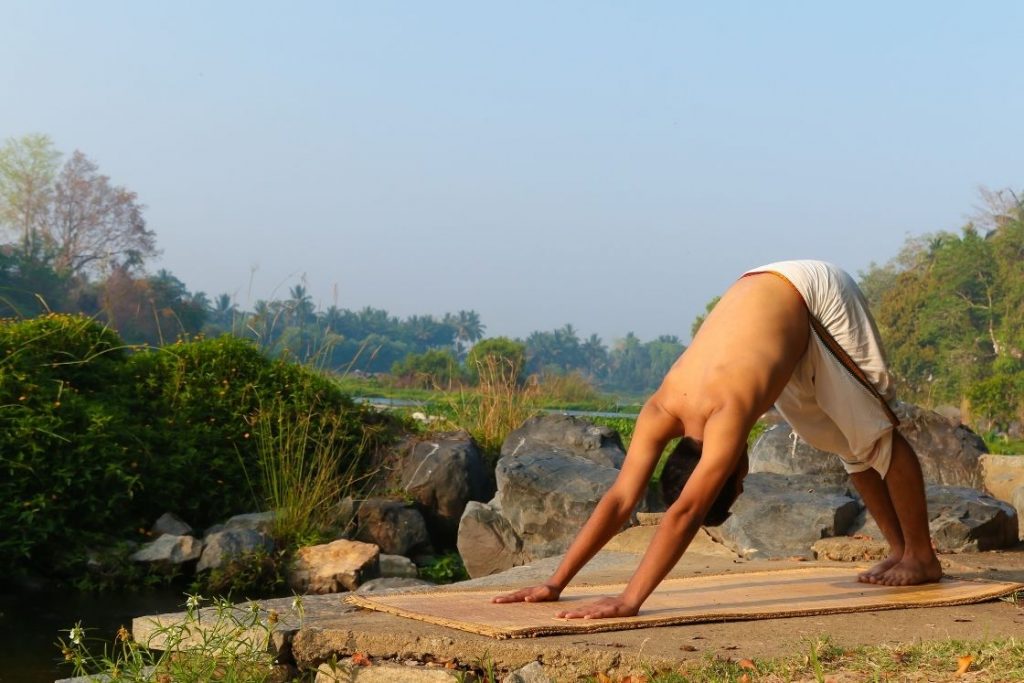
There could be many faces that come to your mind when heard the term “yogi”, for example, your yoga teacher, a famous Indian spiritual guru, a person who loves yoga, or the person you follow on social media for yoga feeds.
Are they all or any of them can really be called a Yogi just by knowing one aspect of their personalities? Certainly not!
Everybody out there practising yoga or teaching yoga in some way or other can’t be called a Yogi. In fact, yogic scriptures have defined certain qualities of the person who can be called a Yogi, they necessarily shouldn’t be an expert in doing different asanas.
Yoga more than a form of physical exercise is a way of lifestyle, therefore, a person to who we are referring a Yogi should be an adept follower of “Yoga as a way of living”.
What is a Yogi?
The ideal definition of a yogi: A person who truly lives their life by the moral codes of yoga and emulates its teaching in every aspect of their yoga sadhana called Yogi.
Everything you think of Yoga such as a physical, mental or spiritual practice is part of yoga sadhana. It comprises all the practices that we do in a yoga class such as asanas, pranayama, Japa, meditation, etc. and a yogic lifestyle as well.
In general, a male practitioner of yoga is called a Yogi and female practitioner is Yogini. The word Yogi shouldn’t be used without understanding the depths of its true meaning. A person doesn’t become yogi by calling himself one. When a person follow yogic lifestyle on and off the mat consistently over a long period, the people and community the person serve may entitled him a Yogi.
In the west culture today the term Yogi become very common in use. There, ‘yogi’ or ‘yogini’ symbolizes a person who does a lot of yoga or maybe wears a fancy set of mala beads with the latest trending yoga pants.
Nevertheless, to appreciate the practical meaning of a yogi in today’s context, we should bring a balance between the ancient definitions and modern-day possible definitions of the concept.
Who is a Yogi?
A person can be yogi in many ways based on how s/he lives the life and their attitude to themselves & towards other. ofcourse the practice of yoga practically and theoretically is important part of the process of becoming a yogi, but the yogic attitude can be present in a person naturally.
You can call a person yogi who;
- Practices the different disciplines of yoga such as asana, pranayama, dharana, dhyana etc, keeping the one higher purpose of “Union with the absolute”.
- Maintains equanimity of mind in every action and situation of life (Raja Yogi)
- A yogi serve society for the betterment of the people and the community at large. And expect nothing in return.(Karma Yogi)
- A yogi indulges in intense self-study and emphasizes the value of scriptures to enlighten the inner self yet lives the life as layman (Jnana Yogi).
- They seek knowledge despite all obstacles on the path of yoga.
- A yogi is the devotee of God and prays that supreme power which governs the universe (it’s called Bhakti Yoga). Being devotee does not mean to be theist at all, but the philosophy of yoga belives highest universal principle, also called the Brahman or absolute reality.
A person can’t be said yogi who doesn’t follow yogic principles in the practice and their day-to-day life as well. Also, not all the yogis are spiritually inclined people. Someone living in the Himalayas may not necessarily be a yogi.
In my opinion, the stage of being called as yogi comes only after achieving a certain level of control on your senses and ego. Reaching to this stage may take whole lifetime for someone and for others it may be a natural state of their being. So it’s the state of mind that makes one a Yogi not the practice of yoga alone.
Mastering the yoga principles and physical postures may hardly take 1 or 2 years of practice, that doesn’t make one a adept yogi, yes they can be called a yoga teacher.
The Bhagavad Gita View

One of great scriptures of Hinduism Bhagavad Gita describes various paths of yoga. In this, Lord Krishna has elaborated the characteristics of a person who is a yogi in real life.
Lord Krishna discusses with Arjuna what qualities are needed to become a true yogi. He emphasizes that fearlessness, perseverance in gaining wisdom, performing yoga, and purity of the heart are the essential qualities in a yogi.
Lord Krishna further elaborates that a person who performs his duties without thinking about the gain or losses or the fruits of his actions is a karma yogi. He also goes on telling Arjuna that a person can be called a yogi when he is equanimous in all the actions he performs.
If we think that these definitions of a yogi are outdated or belong to the ancient era only, we are underestimating the scriptures a bit. What was explained by Lord Krishna is applicable even to this century if we know how to extract a meaning from it.
Achieving equanimity is related to maintaining a calm attitude in every situation of life. A yogi should be able to consistently practice yoga so that the attitude of balance and peace is developed to conquer irritation, impulsiveness, aggression, or any external input that life put us into.
According to Lord Krishna, a yogi is someone who is fearless and takes on the challenges of life. He is not someone who gossips or lies, or conspires against people. A yogi is pure at heart, is good to everyone, and is ready to help and serve others whenever needed.
What are the Qualities of a Yogi?
The lifestyle of a yogi in the 21st century is definitely varied from how yogis used to live in the ancient times in India. However, there are certain qualities that are still the same. Let’s try to understand what qualities make a person a yogi.
A Yogi is successful in his yoga practice only when he possesses or acquires the 6 qualities. They are discussed in Swami Swatmarama’s Hatha Yoga Pradeepika and are called the ways to open the gates of self-realisation for the yogi.
1. Enthusiasm
Enthusiasm or maintaining a positive attitude towards one’s yoga practice and other tasks in day-to-day life is an essential quality of a yogi. A yogi is enthusiastic or willing to make changes in himself as the yogic principles guide. A yogi is not a dull-hearted or heavy-minded person who gives up practice after a minute of distraction.
Rather a yogi is someone who finds the purpose of life in his yogic activities and with great optimism gathers his emotions together and goes to his mat every morning.
2. Perseverance
We all know the saying ‘practice makes a man perfect’. It is true even in the case of following the path of yoga. A yogi should stay in practice no matter how many distractions or mental troubles come his way.
A person is called a yogi when he maintains his enthusiasm throughout the yogic journey and is consistent in his practices. A yogi is not afraid to start over if he fails, or he is not discouraged by the failures in his practice. He continues on the yogic path regardless.
3. Discrimination
After gaining consistency over the practices, a quality that a yogi should possess is the ability to discriminate. Even at the stage of enthusiasm and perseverance, there is a possibility of falling for the acts that pull us down and deviate from the path of yoga sadhana.
A yogi learns the discrimination between what is beneficial and what is detrimental to his yogic practice and follows accordingly. He never lets the detrimental factors affect his yogic sadhana. Discrimination also includes choosing a healthy and preferable lifestyle, eating habits that cooperates one’s journey as a yogi.
4. Unshakable Faith
The attainment of a sattvic yogic routine, the next important quality of a yogi is that he firmly believes in the values he is living. However, it is not the blind faith. Rather it is the conscious feeling of being on the right track of self-discovery.
This unshakable faith makes a yogi travel through the ups and downs of the yogic journey. A yogi does not doubt his capacity, his guru, or his way of practice. But he deeply believes and that is what gets him through the obstacles.
5. Courage
After establishing firm faith on his yogic path, the yogi acquires courage. Here, courage is not referred to as attempting complicated yoga practices. But it means being brave in terms of letting go of your attachments, desires, your false ego and more.
A yogi should be courageous to accept the change yoga is bringing to his life. And he should be courageous to experience the requirements of the practice and let them transform his life.
6. Avoiding a Negative Company
With the acquisition of the first five qualities, a yogi must remember to avoid any company of the people who can derail his journey. People who have a negative approach to living are not helpful for a yogi’s sadhana.
They bring negativity, self-doubt, and also fear along with their negativity. All these factors are detrimental to a yogi’s spiritual progress. Thus, it is suggested to avoid any such company that brings him down.
How to Progress on the Path of Becoming a Yogi?

Reading upon the qualities that are needed for a person to become a yogi, one might get confused as to where to start. As we have seen above, the parameters of becoming a yogi were very much different than the parameters today.
So, what can get us started on the path of becoming a yogi? Let’s look at a few practical exercises in today’s context to answer this.
1. To Begin, Begin!
We spend a lot of time thinking and not doing. To become a yogi, beginning is a must. You can start from wherever you are. If you are passionate about the yogic lifestyle and wish to transform yourself, you have got to begin it right away.
The power of NOW or present moment is what patanjali has discussed in the very first verse of Yoga Sutras.
Atha yoga anushasanam
Now, the teachings of yoga.
—Yoga Sutra 1.1
By this sutra, Patanjali reminds us to be present in the current moment. So what you think or have planned to begin, it should not be delayed.
There is plenty of material available to begin your yogic journey. With progress, you can also take a Guru to guide you through the path. But remember to be enthusiastic about the process you are entering into and enjoy the positive transformation it is going to bring.
2. Be Consistent in Your Yogic Routine
Once you are determined to change yourself as a yogi, the next thing you have to work on is being consistent in your practice.
The essential characteristic of a yogi is to not give up. If you maintain the habit of starting over regardless of the distractions and obstacles, you are on the right path of becoming a yogi.
Consistency can be brought by thinking about the positive effects of the yogic practice or listening to motivational lectures by enlightened yogis and spiritual gurus. Perseverance is a key to becoming a yogi and can be achieved by the simplest acts which help you inspire to involve yoga.
3. Take on Yogic Principles
Once the physical discipline in daily practices is achieved, you can move on taking the yogic principles into practice. Patanjali’s Yoga Sutras, Hatha Yoga Pradeepika, Bhagavad Gita have explained numerous sutras that enhance a yogi’s physical, mental, and spiritual growth.
If you adopt the principles of Yamas, Niyamas, Karma Yoga, Bhakti Yoga, serving others and other principles explaining the importance of equanimity in actions, you go closer to becoming a true yogi. After all, a yogi is the one who understands and lives the yogic principles in his daily life.
4. Engage in Soul-Enriching Activities
Soul-enriching activities are huge in numbers. From reading a good book, listening to good stuff like yogic documentaries, lectures, satsangas to spending a peaceful time in nature or joyous moments with your family. You can engage in the activities that are relevant to your progress as a yogi.
Yogi is not always the one who gives up his family and goes to Himalaya for sadhana. Rather he is someone who stays in his natural habitat and develops as a spiritual being.
5. Develop a Minimalist Attitude
Yoga is a path of non-attachment to material things. In today’s era, we cannot practically give up on many things but we can cut short our needs not to seem less needy but to develop the minimalist approach discussed in Yoga.
You can try to live with the minimal things that are necessary and important. This approach can also help you in developing the attitude of less is better than having more and being disturbed.
Final Thoughts
There are plenty of habits a modern-day yogi should adopt in reference to what has been defined by the scriptures centuries ago. The time context may be different but the essence of yoga practices in all the periods is the same.
Being a yogi does not take away your normal life but teaches you to live your normal life with discipline, love, gratitude, and peace. It does not teach you to leave aside your normal clothes and wear saffron but instead guides you to drop off your ego by involving in yogic activities.
A path of a yogi is a path of determination, consistency, courage, love, and compassion. And in a world full of resourceful and informative activities, we sure know how to select the ones that will make us a yogi!





Being a yoga teacher of long standing, and a meditator, I did not feel it a necessity to learn all I’ve read today from your kind heart.
I gave up meditating (I’d meditated not stop for 33 years) daily 8 years ago not deliberately but rather I had to go to hell and back and face my Demons.
Meditation had cushioned my life and my childhood past was left behind. But the samskaras I see although blocked, now surfaced and I rescued a part of my consciousness ( an infant in a dungeon wrapped in an army blanket, fearful, resentful, angry, hurt, etc, ) who refused to come out.
Over the last 8 years slowly slowly, going to hell and back, ( I had to face horrific experiences) as well as being physically, mentally, emotionally, debilitated, as traumas where unleashed.
Eventually finding authenticity, self love, I do not allow any abuse which had continued from my childhood from those who mirrored my childhood repressed contents.
These people became an asset acting as mirrors to clear away the old to make way for the new me, I see now.
Now it’s time in my life, I’m 76 years old, to rise from the ashes, not a victim anymore rather a greatful soul who had spent her years from being 33 years old when she learned to meditate, and at 40 years educating myself, becoming a well thought of therapists helping others to find their self love.
So now I’m ready to practice, the essence of yoga, replacing the old mind set for the new.
For my mind set still churns up, those limited thoughts keeping me repeating old patterns, although I’m aware now and that’s a blessing.
Thank you once again, I’m moving towards being a yogi, and not just the yoga teacher! 🙏😃